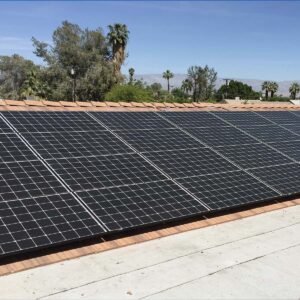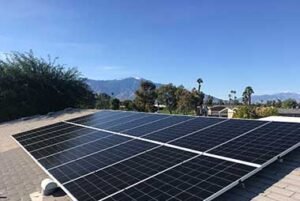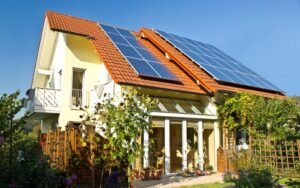Overpaying for Your Energy Bills? Get Home Solar Panel Installation Done & Start Saving Today!
 The idea of going solar with electricity supplies and generating our own power through renewable means is attractive to many consumers for one of two key reasons – the promise that it will help us protect the environment by cutting carbon footprints or the promise of great savings on energy bills.
The idea of going solar with electricity supplies and generating our own power through renewable means is attractive to many consumers for one of two key reasons – the promise that it will help us protect the environment by cutting carbon footprints or the promise of great savings on energy bills.
While this all sounds great, there are still plenty of considerations when installing solar panels for your home and there are some cons as well as pros. This introduction to the benefits and disadvantages of installing solar power systems will highlight both sides of the issue to help you see if it really is right for you?
Get Your Free Solar Quote Here
The benefits of going solar: why the simplicity and accessibility of these systems make them a great choice when going green
Two important concerns that buyers express when considering the pros and cons of solar panel installation are the suitability of their home and the hassle involved in getting set-up. With the right company and some pre-planning, neither of these factors should be a big issue. There are issues that affect the suitability of a home but they may not be as bad as you expect.
Homes in southern states are obviously going to benefit more from the amount of sunlight and those with south facing roofs are always going to perform better and features that might obscure the roof from direct sunlight and poor weather will also play a part in efficiency but these are the biggest obstacles for getting approval for a solar system..
 For those concerned about the hassle of the set-up, there are the additional advantages that solar panels are easy to set-up and maintain with professional installation. Solar PV systems are generally straightforward to put in with no difficult maintenance to consider further down the line.
For those concerned about the hassle of the set-up, there are the additional advantages that solar panels are easy to set-up and maintain with professional installation. Solar PV systems are generally straightforward to put in with no difficult maintenance to consider further down the line.
Professional solar panel installers will come and put in your new system and it is not an intrusive or time consuming process in the right hands. If the system is in the right place and functional, it should deliver power and, if it turns out to be as efficient as hoped, there should be some great savings too.
Click Here to Get Your Free Solar Quote Now
How is installing solar panels for home so simplistic? Aren’t solar panel systems complicated, high-tech set-ups?
There are a lot of clever processes that happen within a solar panel in order to transform the energy of the sun into efficient, usable electricity for the home but it is all contained within those those tiny cells, the inverter and – if users are looking to store the energy more effectively – the battery system. The parts are easy to install and can essentially be left to do their thing.
The photons from the sun’s energy react with phosphorus in the top layer and send electrons towards the boron layer, creating positive and negative layers with a strong electrical field in-between. This DC current is then sent to the inverter to transform it into the AC current that it safe to use within the home. This mains AC current is then ready to use at the sockets and can also be stored in the battery.
The disadvantages of going home solar system: why costs and feed-in tariffs need to be considered before you commit to solar panel installations.
The biggest problem for many consumers is the cost involved in setting up a solar PV system because not only can it be expensive, they can vary greatly from state to state and depending on the type of system used.
Some websites quote an average as broad as $15,000 and $40,000 which is a sizeable sum, but there are different schemes out there that lease the panels and different ways of working out the financial side. It is also worth remembering that the cost of solar panel systems has decreased significantly in recent years with accessibility and market competition.
There are costly ways of adding solar to a home, and the costs will increase with every panel that you require to cover your energy needs, but a little research goes a long way so it is definitely worth shopping around to see what the best deal is. In addition to this, there is also the chance that this long-term investment could increase the value of your property if you ever come to sell it.
 Some prospective buyers would prefer to buy a home that is already set-up for solar power as it is one less thing to worry about later. Figuring out the costs and affordability of panels takes time and consideration as this needs to be off-set against the savings that are potentially going to be made and the overall benefits that the panels will provide.
Some prospective buyers would prefer to buy a home that is already set-up for solar power as it is one less thing to worry about later. Figuring out the costs and affordability of panels takes time and consideration as this needs to be off-set against the savings that are potentially going to be made and the overall benefits that the panels will provide.
They can be a great way of saving on energy bills and there is the ability to earn from feed-in tariffs, although the rules on these tariffs can vary and there is always the chance of government cuts.
Since the end of 2008, the government has provided a 30% tax rebate with no upper limit and there are other schemes that home owners can look into that may help with costs in another way. Again help and accessibility regarding solar panel installations and options can vary from state to state. California, for example is seen as a forward thinking area with its technology, solar panel usage and other new initiatives but the country as a whole still has work to do.
Installing solar panels for your home: is it the right option for you?
It is important that you don’t get too caught up in the obvious environmental and financial benefits of going green for cheaper, renewable energy when there are so many other considerations. While installation is pretty straightforward with an experienced company, you still need to check that the roof is suitable and the system you want is viable.
As for the financial aspects, double check costs against projected savings and be aware of the situation with the feed-in tariffs. Double check your sums and suitability, do plenty of research on the best options. Then, if everything still falls nicely into place, you can go on to enjoy all the benefits of simple, green energy production and lower bills from an effective home solar system.
Click here to check how much can solar save you?